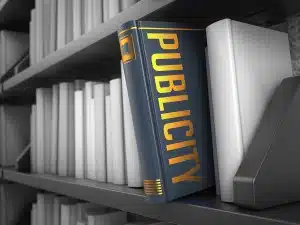Of all the tactics an author can use to become noteworthy, getting your book reviewed by the New York Times is right up there.
A thumbs up from the likes of Publishers Weekly or the Library Journal is not just some stroke for the author’s ego. It can translate to big bucks in terms of buy-in for your book. The right recommendation can open doors for an author where before there only seemed to be a brick wall.
Once you’ve finished writing your book, getting wide distribution in the marketplace should naturally become your focus. Book buyers hesitate to engage with an author they’ve never heard of. I mean, even you and I hover briefly over the 1-Click Order button on Amazon before committing to an unknown author. Book buyers and readers alike look for a source of information they can trust before making a buying decision on a book in a sea of millions of book titles.
Reviews provide that confirmation, whether the comments come from consumers or professional critics. So, let’s explore how to get your book reviewed by major trade publications. Every successful author has been unknown at some point, and reviews help to bridge that gap between obscurity and celebrity. Finding reviewers who are willing make your name known is a simpler process than you might expect.
Why Book-Trade Reviews?
Reviews have a permanence that time-based media just doesn’t have. TV and radio shows can offer a wide audience. However, their time-based quality means a lot less leverage for you, the author, in getting your name in front of your chosen audience. The shows typically air just once, and then they’re gone.
Written reviews in trade journals, libraries, magazines and websites will last for years. Any time your book-buying public is looking for information about you or your topic, they’re going to stumble across those reviews. In fact, you can even excerpt these reviews and use them in your marketing materials.
So how do you do it? What’s the secret to getting the guys at the top to notice you? Is there some kind of mojo that only hired publicists have the license to practice? Let’s look at a two-pronged effort to do just that.
Freedom of the Press and Other Juicy Tactics
One method you can use to publicize your book is writing press releases and getting distribution. Sometimes press releases are picked up by major publications, which can provide amazing support for a book release.
In addition to reprints from major media outlets, your press release can end up being indexed by Google for your main keywords. This puts your announcement in front of all kinds of book reviewers, online bloggers and the buying public.
To request a book review from one of the major trade publications, the process is not that complicated. In fact, it involves only one step: ask.
Start by sending a personalized e-mail with details about your book, then wait for a response. Make your query tailored to the publication you’re submitting it to, and use the editor’s name in your greeting. Don’t make your submission about you; make it about them. Be direct about how your material will interest and benefit their audience.
This method may yield a certain amount of failures, but that’s part of the process. The best baseball player hits the ball only 3 out of 10 times. You can make up for what you lack in skill with a large number of review submissions. And over time, you’ll get better.
With that in mind, here is a list of contacts for Media & Trade Review Submissions:
Publishers Weekly (retail trade buyers)
Library Journal (library buyers)
Shelf Awareness (retail trade buyers)
The hardest part of putting your book in front of the professionals on this list is getting started. It can be overwhelming. Contacting any publication you respect or admire can be intimidating. So muster-up your courage and dive in. Get organized, and keep moving.
Remember that reviewers would be out of business if it weren’t for authors like you. You have an obligation to give them something to talk about. Who knows? The next review you read may be your own!
 Bryan Heathman is the President of Made for Success Publishing. Bryan works with bestselling authors in the role of publisher and marketer, including the late Zig Ziglar, Chris Widener and John C. Maxwell. Bryan is the author of Conversion Marketing, a marketing book that condenses knowledge on website conversion from 7-years running an online ad agency. Bryan’s Fortune 500 experience includes running high impact marketing campaigns for Microsoft, Eastman Kodak and Xerox.
Bryan Heathman is the President of Made for Success Publishing. Bryan works with bestselling authors in the role of publisher and marketer, including the late Zig Ziglar, Chris Widener and John C. Maxwell. Bryan is the author of Conversion Marketing, a marketing book that condenses knowledge on website conversion from 7-years running an online ad agency. Bryan’s Fortune 500 experience includes running high impact marketing campaigns for Microsoft, Eastman Kodak and Xerox.

